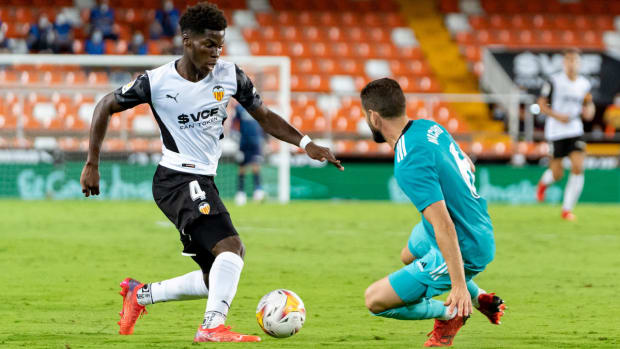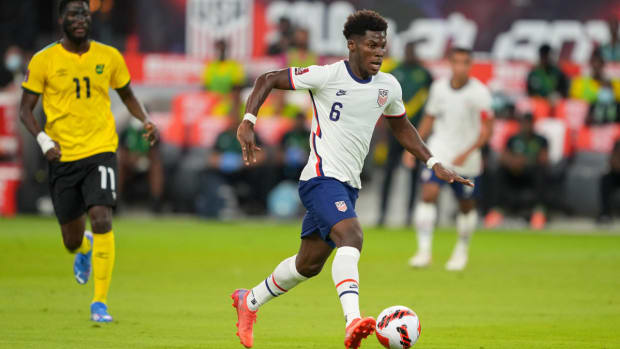The 18-year-old Valencia midfielder has had to be patient to make his contribution in competitive play for the U.S., but after being cap-tied vs. Jamaica, his time has come.
PANAMA CITY, Panama — After the courtship, the trial run, the anticipation and then the decision, there was an uncomfortable and unexpected wait.
That doesn’t seem like the way this sort of story typically plays out. The presentation of record should follow the fanfare. But in the case of Yunus Musah, his March commitment to the U.S. men’s national team didn’t lead directly to his competitive debut. Months went by. He was benched. He was injured. And the squad Musah was so excited to join, and to which so many were eager to welcome him, progressed in his absence.
World Cup qualifying forces players to adapt to strange rhythms. They have to maintain a strong sense of internal equilibrium as they cross borders and time zones, adapt to different teammates and opponents and, now, in Concacaf’s Octagonal, play games in new countries on only two days rest. You may have to play a match that means everything on fumes. Or, in Musah’s case, you may be thrust into the spotlight after months of disappointment and delay.
It’s still early for Musah. He’s 18. But there was a lot of hype over the New York City-born and Arsenal-bred midfielder two years ago, when U.S. men’s national team coach Gregg Berhalter and assist Nico Estévez started reaching out to the teenager. Musah, a veteran of England’s junior national teams, had left North London for Valencia in the summer of 2019. Estévez had previously coached in the Spanish club’s academy.

Adam Davis/Icon Sportswire/Getty Images
“It felt like the manager really wanted me to be here—be part of the group, be part of his plans, and that makes me feel kind of special,” Musah said here in the Panamanian capital, where the U.S. is preparing for Sunday’s World Cup qualifier against the hosts. “To be asked to be a part of that is a great feeling.”
Musah started in a couple of friendlies that November and formed a tantalizing trio with Tyler Adams and Weston McKennie. Musah’s ability to surge through midfield with the ball at his feet and to unbalance defenses with his acceleration, agility and vision stood out. He was an asset. And he was just getting started. But he was also eligible to play for Italy, where he lived as a child; England, to which he moved as a nine-year-old; and Ghana, his parents’ homeland. Those are all pretty good options.
Berhalter and Estévez coaxed him into the U.S. fold, where a slew of young, talented and ambitious players were focused on launching a new international era. In March, Musah committed his international future to the U.S.
“It was a lot of conversations about what this young group could do and the potential of this young team and the players we have in the pool,” Berhalter said. “How we saw him fitting into our team, talking about America and what we want to do as a group, and I think that’s what really got him excited about the project.”
Musah still hadn’t spent much time in the U.S., but he was sold on the idea of representing the country of his birth and on getting an early senior start with so many peers. There was considerable attention paid to the announcement of his commitment. But his competitive debut would have to wait. After appearing in three more friendlies, Musah was called in but didn’t play a minute in the two Concacaf Nations League games in June. Excitement morphed into concern. Did he not fit Berhalter’s system as well as many hoped? Would Musah reconsider his decision because he still wasn’t cap-tied?
“I talk to all the guys about understanding that they’d be disappointed if they’re not on the field, not in the starting 11. And that’s just part of it. But part of building a strong team is to have everyone engaged and everyone pulling in the same direction,” Berhalter said Saturday.
“In Yunus’s case, coming into the Nations League, playing at altitude [in Denver], he wasn’t playing regularly for his club and we didn’t feel like it was the right time.”

Xisco Navarro/SOPA Images/Sipa USA
Musah admitted here that missing out on Nations League minutes was “annoying,” but he said that he understood Berhalter’s decisions. And it didn’t weaken his allegiance. If anything, his connection to the U.S. was strengthened this summer by his time with the team (he started a subsequent friendly against Costa Rica) and then an extended holiday in NYC. Now a U.S. international, Musah finally had the chance to reconnect with his hometown and really tap in to the American inside him. He spent time with an uncle who lives in the Bronx and had the ideal guide in U.S. teammate Tim Weah, who was home for the summer after winning the French title with Lille.
“We kind of just had a little experience together, went out to eat and stuff like that,” Weah said. “The bond that we have with this group is amazing and the bond I have with Yunus, he’s like my little brother obviously. I showed him around. He was with me and my family, just chilling and enjoying everything that New York has to offer. He even went around by himself and just kind of took everything in. Seeing that he wants to connect a lot more with American culture is great for him and it’s great for us.”
NYC offered “a nice vibe,” Musah said.
“I always love coming back to the U.S. and being with the national team,” he added. "It makes me connect with this part of myself and I love being here.”
But Musah would have to remain patient as an ankle injury ruled him out of the Octagonal’s opening window in September. Those three games proved to be a vital learning experience for this young U.S. team as 16 men made their World Cup qualifying debuts. The Americans went 1-0-2.
Finally, after returning to Valencia’s starting lineup toward the end of September (albeit on the flank), Musah was ready for International duty. Berhalter said that he and Estévez remained in constant contact with the player and his club. Musah was called up for this month’s qualifiers and he was on the field as the U.S. kicked off against Jamaica on Thursday in Austin, Texas. At that moment, his bond with the U.S. national team was sealed technically, even though it already had been cemented in his heart. Starting again alongside Adams and McKennie, Musah showed multiple flashes of the player who can bomb his way through midfield, and he played a key role in setting up Ricardo Pepi’s opening goal. The Americans went on to win, 2-0, and are 2-0-2 and in first place heading into Sunday’s meeting with Los Canaleros (1-1-2).
“I thought he had an excellent game,” Berhalter said in Austin. “We talked about his quality of driving at the defense and unsettling the defense and he did that constantly. And it's difficult, man, when you have someone dribbling at you who’s that agile and that mobile and that keeps the ball that close to them. It becomes challenging for the defense. We’ll look at some defensive work, but overall, I thought he had a good performance.”

John Todd/ISI Photos/Getty Images
Agonizingly, Musah’s participation in Austin was in doubt the day before thanks to an inconclusive COVID-19 test. He trained apart from the team and didn’t know until just before dinner on Wednesday that he was negative and able to play. He was understandably thrilled to make his bow in a meaningful game.
“After being involved in the Nations League and not playing in the Nations League, thinking that was possible again due to COVID was really annoying. But I’m glad it was a quick process and they realized it was nothing, so I was happy about that,” Musah said. “It was a big moment for me, you know? In my mind I just wanted to win in my first competitive game and I’m happy we got a win.”
Now after all that waiting, Musah may have to turn around and do it again less than 72 hours later. It’s a lot to ask, but the stakes are high and that’s the rhythm and resilience that qualifying demands. Berhalter is comfortable rotating men in and out of the lineup—he used 22 across the three games last month—but McKennie’s absence due to muscle soreness means there’s already going to be at least one new starter among the midfield three.
Berhalter can turn to the experienced Kellyn Acosta, Sebastian Lletget or Cristian Roldan. But if he wants a player who can unlock the opposition and force a defense into tough decisions, Musah probably will be the choice. Panama is a rugged side coming off a loss suffered on a sodden field in El Salvador. While it may be tempted to approach Sunday’s vital home game on a more offensive footing, defense remains Los Canaleros’ strength. A fan of advanced stats, Berhalter said that Panama leads the Octagonal in expected goals allowed. The Americans are second.
“Panama’s definitely a very physical team, an aggressive team. We’ve got to be able to match that right away,” Acosta said. “Now coming back home they’re looking from the first minute to kind of take it to us, so we need to be ready for that and match their intensity.”
If called upon, Musah will most certainly been ready. After months of hurry-up and wait, he’s now living his ambition. This is what he signed up for.
“Since I joined the U.S., I’ve always had this in mind,” he said. “Trying to be able to participate in a World Cup has always been a dream of mine. We’re on our way to doing that, and we’re trying our best to be able to go to the World Cup.”
More USMNT Coverage From Brian Straus:

0 Comments:
Post a Comment